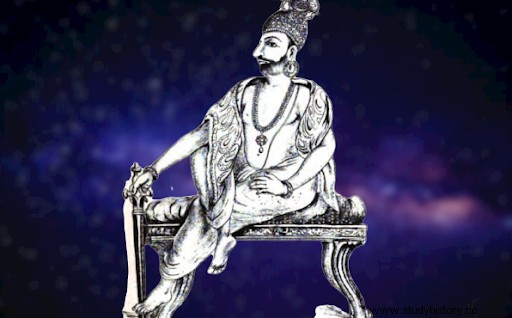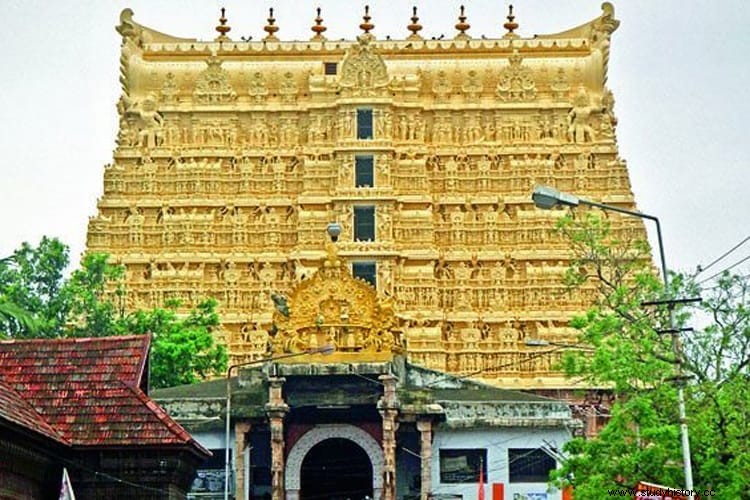The people of the European country were considered invincible at sea, but you know that about 250 years ago, King Marthanda Varma of Kerala defeated the Dutch sea army, that too with traditional weapons. But our historians, the mental slaves of foreigners, suppressed the history of this glorious victory. The reality is that India had been a maritime power since ancient times, yes, this power was also badly affected during the Islamic period. But the way the Chola kings conquered the maritime kingdoms of the south and southeast and expanded the Vedic Aryan culture there, it seems that South India was maintaining a strong position in the maritime power till much later.
Who were the Dutch
The Dutch are called the people of the Netherlands. Like the Portuguese and the British, the Dutch were also a major force in Europe. He was in control of the world's trade for almost 50 years. In 1602, the Dutch government formed a company. Which was known as the Dutch East India Company.
It had 17 share holders. The power of this world's richest and powerful company had become more than the Portuguese and the British at that time. He captured the spice trade of Asia. Spices were more valuable than gold in that era.
Black pepper is the highest in Kerala. On which the Dutch East India Company was eyeing. This was such a spice, which was in great demand all over the world. In those days black pepper was more valuable than gold. European traders were drawn to the sea shores of Kerala in search of black pepper treasures.
Small but mighty kingdom of Travancore

Travancore royalty has the biggest contribution in the history of Kerala. In this too, the history of Travancore is incomplete without knowing about King Marthanda Varma. He ruled from 1729 to 1758. In these 29 years, he made Travancore a big kingdom and defeated all his enemies. Be it the enemies inside the house or outside. Marthanda Varma defeated the Dutch Navy, which was considered a great power of that time.
King Marthanda Varma campaigned for the integration of Kerala to save Kerala from foreign power and strengthened the state by conquering the princely states like Attingal, Quilon, Kayakulam etc. On the victory of Kayakulam, Dutch governor Gustaf Willem van Imhoff expressed his displeasure by writing a letter to Marthanda Varma, to which Marthanda Varma replied that it is not your job to interfere in the affairs of the kings. You guys are just businessmen and care about your business.
After conquering the surrounding states, now his eyes were on the state of Venad (Wayanad), where black pepper was cultivated the most. But the Dutch company had a monopoly on the chilli trade of Venad. Martanda Varma wanted to break it and by conquering Venad, he also succeeded in breaking it.
Dutch governor Imhoff threatened a war on the continued conquest of Travancore, to which Marthanda Varma replied, "I would overcome any Dutch forces that were sent to my kingdom, going on to say that I am considering an invasion of Europe" ( Koshy, M.O. (1989). The Dutch Power in Kerala, 1729-1758)
Dutch attack on Kerala
When Dutch governor Imhoff played a diplomatic trick with the defeated kings, Marthanda Varma captured all the forts of the Dutch in Malabar. An enraged Imhoff sent Commander De Lennoy with a huge navy to attack Travancore from Sri Lanka.
The Dutch East India Company had the most modern weapons of that time. The Dutch commander De Lennoy arrived from Sri Lanka with seven large warships and several smaller ships. The Dutch army set up its camp on Kolchal Beach. Marthanda Varma's capital Padmanabhapuram was just 13 km away from Kolchal. Dutch ships surrounded the maritime border of Travancore. His artillery continued to bombard the city. The Dutch Company made several attacks from the sea. Shells continued to rain in the city continuously for three days. The city became empty. Now the king had to think how his army would be able to compete with the modern weapons of the Dutch army.
The cleverness of Raja Martanda Varma
But the battle is won not by modern weapons but by mind and courage. The Dutch army was bombarding with cannons. But Martand Verma worked with his mind. He cut coconut trees and loaded them on bullock carts as if cannons were taut.
One strategy of the Dutch army was to first rain shells from the sea through cannons. After that his army used to move slowly and dig trenches and build forts. In this way he slowly established his power. But the Dutch army did not advance due to the fear of Marthanda Varma's fake guns.
On the other hand, Martand Verma laid siege with his ten thousand soldiers. Small attacks started from both sides. The Dutch commander De Lennoyne tried to get the fishermen from Kerala with him. They were lured with money but this trick of the foreigners failed. The fishermen remained attached to their king, they fully supported the army of Travancore.
Martanda Varma defeats Dutch army
Marthanda Varma had chosen the monsoon time for the last battle so that the Dutch army would be trapped and they could not get any help from Sri Lanka or Kochi. He himself led the Nair Navy and surrounded the Dutch army in the sea of Colachel near Kanyakumari. The Dutch army was heavily attacked by Martanda Varma's army and their weapons warehouse was blown up.
After several days of fierce sea battle, Martanda Varma was victorious on 31 July 1741 AD. In this war about 11,000 Dutch soldiers were taken prisoner and thousands were killed. The captains of 24 Dutch Navy contingents, including Dutch Commander De Lennoy and Deputy Commander Donadi, were taken captive by the Indian Army and produced before Raja Marthanda Varma, who was kept captive at Udayagiri Fort by order.
King Marthanda Varma built a victory pillar at Colachel in the joy of this victory. This victory of Marthanda Varma caused heavy losses to the Dutch and ended the Dutch military power in India.
Generosity and farsightedness of Raja Martanda Varma

Later the captured Dutch soldiers were sent to Aden under the supervision of the Nair Navy on the request of the Netherlands government, on the condition of not sending them back to India, from where the Dutch soldiers took them to Europe. After a few years, Commander De Lennoy and Deputy Commander Donadi were pardoned by Marthanda Varma on the condition that they would train the king's soldiers at Udayagiri as servants of the king for life. Commander De Lennoy died in Udayagiri Fort where his tomb is still preserved.
In a grand ceremony held in 1750, the king of Travancore dedicated his kingdom to Lord Padmanabha Swami, who then ruled Travancore as a slave of Padmanabha Swami. Since then the rulers of Travancore have been called slaves (Padmanabhadasas) of Lord Padmanabha Swami.
Before his death in 1757, the visionary King Marthanda Varma wrote to his successor Rama Varma, “What I did to the Dutch, the Nawab of Bengal should do to the British. Defeat them by fighting in the Bay of Bengal, otherwise one day Bengal and then the whole of India will be occupied by the British."
